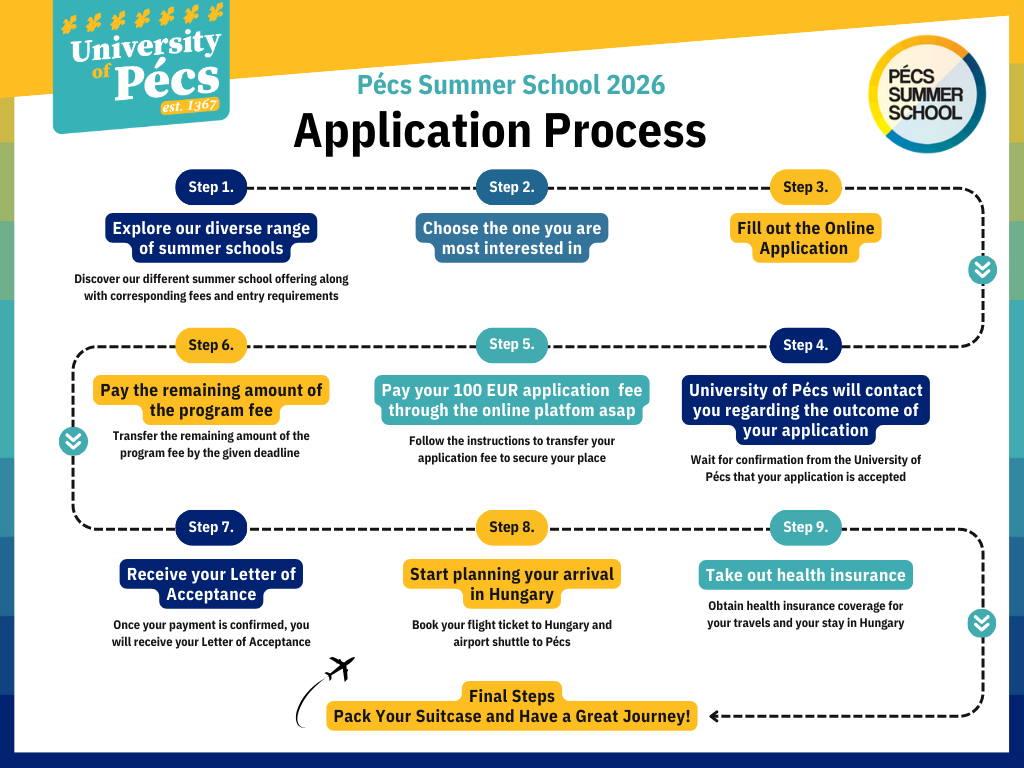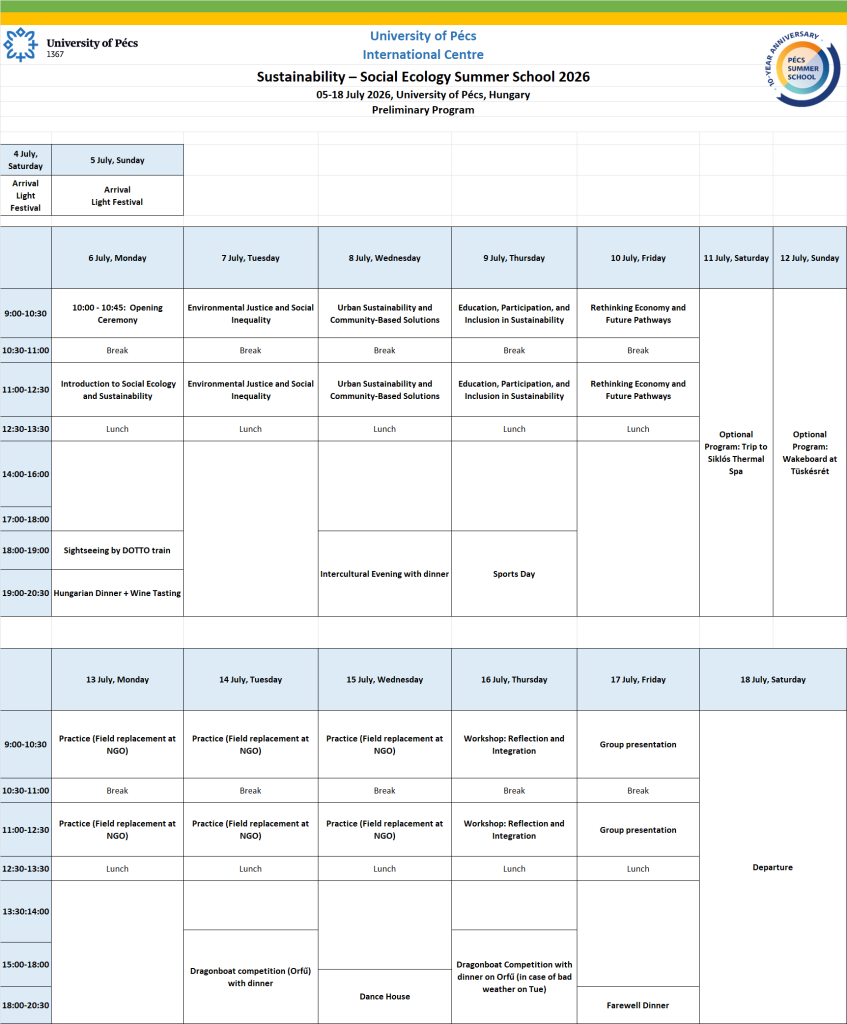Social Sciences
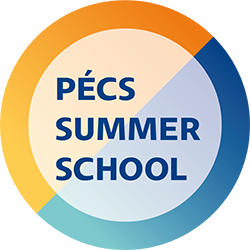
- Study Program
- Schedule
- Social Program
- Accommodation
- Fees and Payment
- How to Apply
- Contact Us
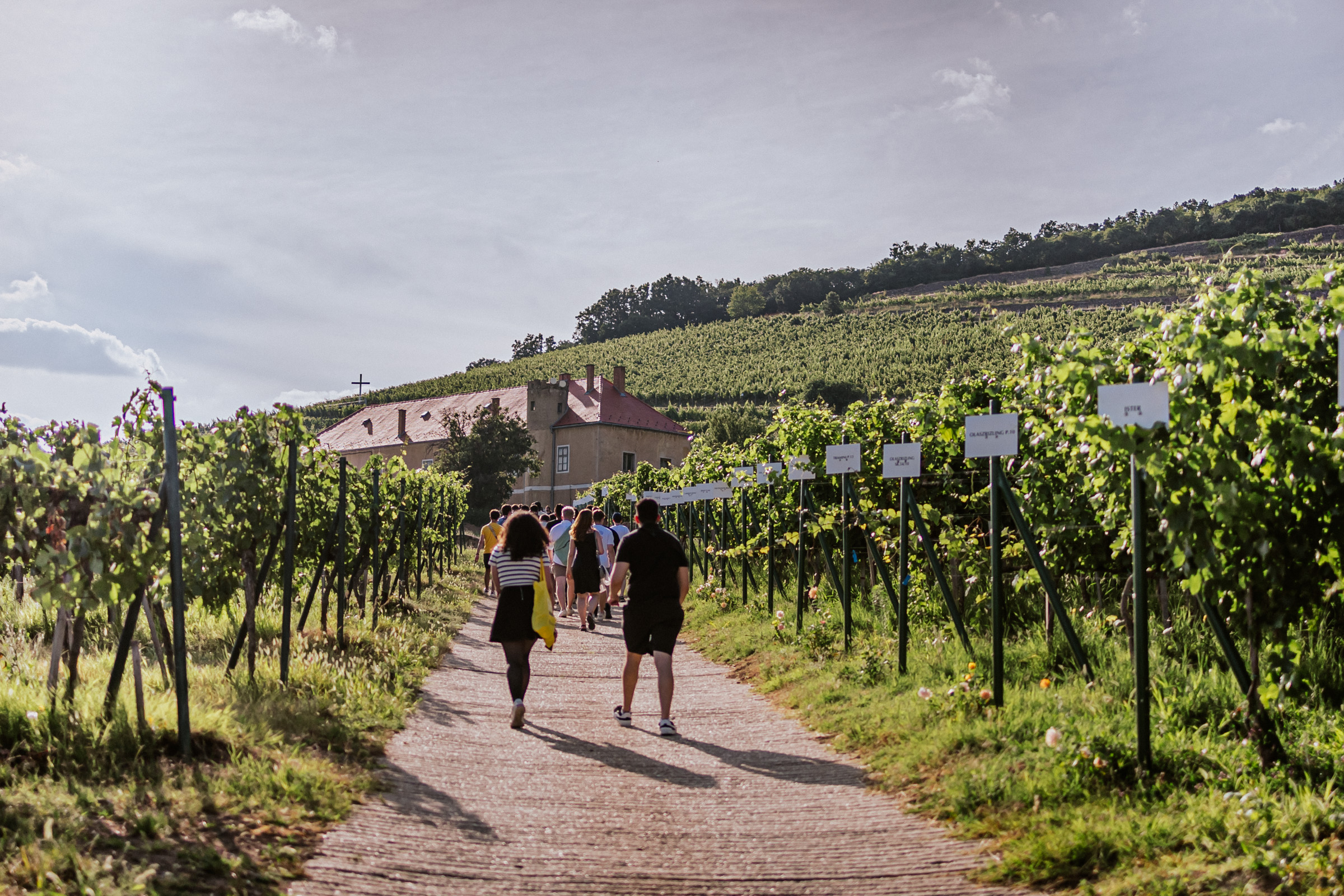
Organizing unit
University of Pécs, International Centre
Course Location
University of Pécs, Hungary
Study Program
Description of the academic program:
This summer school aims to provide students with a holistic understanding of sustainability by combining theoretical lectures with practical engagement. Participants will explore key concepts of social ecology, the interconnectedness of social and environmental systems, and the role of communities and civil society in promoting sustainable futures. By working directly with local NGOs, students will gain hands-on experience in addressing ecological and social challenges, bridging theory and practice.
The program emphasises sustainability as both an environmental and a social issue, highlighting how questions of justice, equity, and participation are inseparable from ecological concerns. Students will critically engage with contemporary debates on urban sustainability, environmental justice, and alternative economic models, while reflecting on the complex relationships between stakeholders such as governments, businesses, local communities, and non-governmental organisations.
Through lectures, field practice, and collaborative workshops, the summer school creates an interdisciplinary learning environment where theory is tested against lived experience. Students will be encouraged to analyze how global challenges manifest in local contexts, and how grassroots initiatives can inspire broader systemic change. The combination of academic and experiential learning will enable participants to develop not only analytical skills but also practical insights, preparing them to act as responsible and creative contributors to more sustainable societies.
Learning Outcomes
By the end of the program, students will be able to:
Understand the main theories and principles of social ecology and sustainability.
Critically analyse the social and environmental dimensions of sustainability challenges.
Recognise the importance of community-based approaches and grassroots initiatives in sustainable development.
Apply interdisciplinary perspectives to real-world ecological and social problems.
Reflect on personal and collective responsibility in shaping sustainable futures.
Present findings and insights in a structured, collaborative group format.
Download the syllabus from here
Lectures:
Introduction to Social Ecology and Sustainability
Concepts of ecology and society as interconnected systems.
Historical development of sustainability thinking.
Overview of ecological crises and social inequalities.
This lecture introduces the foundations of social ecology, examining the interdependence of social systems and ecological systems. Students will explore the evolution of sustainability as a concept, key global challenges such as climate change and biodiversity loss, and the role of human agency in shaping ecological futures.
Environmental Justice and Social Inequality
How environmental degradation disproportionately affects vulnerable groups.
The concept of environmental justice.
Stakeholders: conflict of interest and values
Case studies from global and local contexts.
Focusing on the unequal distribution of environmental risks and resources, this lecture explores how disadvantaged communities are disproportionately affected by pollution, resource scarcity, and climate change. It also highlights stakeholder conflicts (such as tensions between corporations, governments, local communities, and NGOs) when economic development clashes with ecological and social well-being. Real-world case studies will illustrate how power relations shape sustainability outcomes.
Urban Sustainability and Community-Based Solutions
Sustainable cities and the challenges of urbanisation.
Community gardens, urban farming, and green public spaces.
The role of citizen initiatives in urban resilience.
This lecture addresses the challenges of sustainability in urban environments, including overconsumption, waste management, and green infrastructure. Students will examine grassroots responses such as community gardens, cooperative housing, and participatory urban planning, considering how local initiatives foster resilience and social cohesion in cities.
Education, Participation, and Inclusion in Sustainability
The role of education and participatory processes in sustainability.
Involving marginalized groups and fostering social inclusion.
NGOs and civil society as educational actors.
The focus here is on the human and cultural dimensions of sustainability. Topics include participatory education, civic engagement, and inclusive practices that empower marginalised groups. Case examples will show how NGOs and civil society play key roles in fostering awareness, agency, and long-term cultural change.
Rethinking Economy and Future Pathways
Alternative economic models: circular economy, degrowth, solidarity economy.
Linking economic change with ecological balance and social justice.
Visions of sustainable futures.
This session challenges students to think beyond traditional economic models by engaging with concepts such as circular economy, degrowth, and solidarity economy. Emphasis will be placed on linking economic systems with ecological integrity and social justice, while envisioning practical pathways toward sustainable and equitable futures.
Practice (3 days)
Students will be divided into two groups to collaborate with local NGOs:
Community Garden NGO – students will engage in ecological practices such as gardening, composting, and understanding food sustainability while also reflecting on the role of community spaces in urban well-being.
NGO for Disadvantaged Children – students will support educational and recreational activities, observing how social sustainability, education, and care are linked to broader sustainability issues.
Through these experiences, students will directly encounter the interplay between ecological issues and social justice.
Workshop: Reflection and Integration
After the field practice, students will participate in a one-day workshop facilitated by the teaching team.
Structured group discussions about experiences in the NGOs.
Comparative analysis: what ecological and social sustainability mean in different contexts.
Linking field experiences with theoretical concepts from lectures.
Preparing for the final group presentations.
Final Assignment
Group Presentation: Students (in groups of 4–5) will design and present a sustainability project proposal inspired by their NGO experiences. Projects should integrate ecological and social dimensions, demonstrate awareness of community needs, and reflect on possible long-term impacts.
Presentations should last 20–25 minutes and will be delivered on the final day, followed by collective feedback and discussion. Students may use PowerPoint, Canva, Prezi, or any other application that allows the inclusion of visual elements to support their presentation.
Subject of the program:
Social and Environmental Sustainability, Social Ecology, Civil Activism
Format:
Interactive lectures
Peer learning
Problem-based learning
Field visit
Field practice
Project-based learning
Guided classroom discussion
- Group work
Credits offered: 6 ECTS
Language of instruction: English
Leader of the academic program: Viktoria Borda, Head of the International Programme (Institute of Social Relations)
Language requirements: Minimum English language requirements: Independent user (B2 according to the Common European Framework of Reference for Languages)
Looking for more? Combine your chosen Summer School with the Debate Academy and double the knowledge, skills, and fun!
The dormitory is located in the city centre and you will be placed in two-bedded rooms. There are two rooms per housing unit equipped with private bathroom and kitchen. Address: Pécs, Breuer Marcell sétány 2, 7622
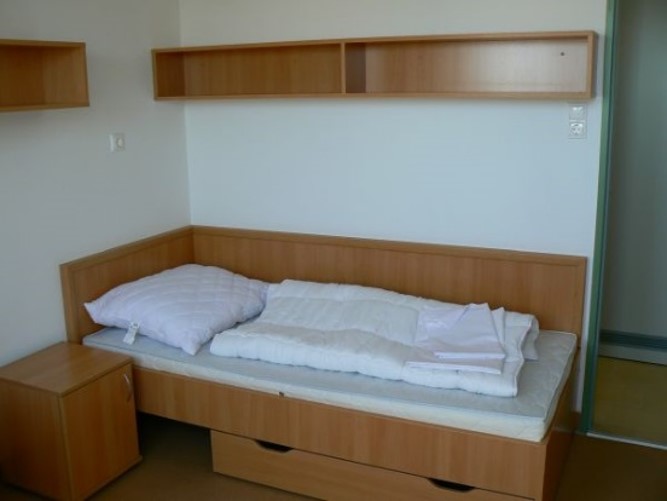
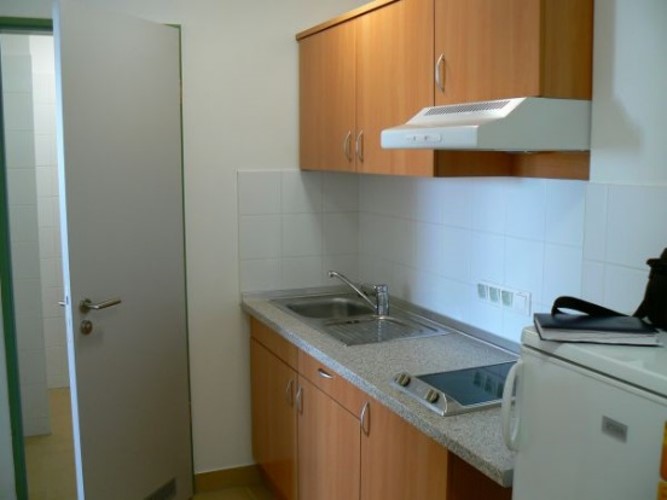
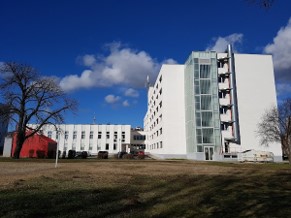
Program fee:
1050 EUR
The program fee includes the following:
The program fee covers: cost of instruction, accommodation, lunch on teaching days, four dinners, city tour and social programs.
After the official confirmation of your application, we will send you the details of the online payment.
Application fee:
Secure your place by paying a 100 EUR application fee that will be deducted from your overall program fee of 1050 EUR. You can make your payment through our online application platform (apply.pte.hu)
After you have paid the entire sum of the program fee, you will receive your Letter of Acceptance. The Letter of Acceptance will be needed for your visa application if a visa is required to enter Hungary from your country. (Please visit the website of an Embassy or Consulate of Hungary in your country to get informed whether you will need a visa or not)
The program fee covers:
cost of instruction
accommodation
lunch on teaching days
four dinners
city tour and social programs
After the official confirmation of your application, we will send you the details of the online payment.
Refund policy:
As a general rule, if the Participant withdraws their intention to participate after the payment deadline, they are not entitled to reclaim the paid program fee.
If the Participant withdraws their intention to participate in writing due to an extraordinary circumstance beyond their control, and can prove this extraordinary circumstance, the paid program fee can be refunded to the Participant.
You will need the following documents for a valid application:
Verification of Enrollment*
Proof of English language proficiency
Copy of ID card or passport
*The verification of enrollment document is an official document provided by your home university, stating that you are a currently enrolled student. Typically, you can ask your international coordinator how to obtain it.
Please ensure that you upload your documents in English.
English language requirements:
| Accepted language test | Minimum result |
| TOEFL (iBT internet - based) | 72 points |
| IELTS (Overall Band Score) | 5.5 |
| Duolingo English Test | 105 points |
| Cambridge ESOL | B2 level |
| TELC | B2 level |
| ECL | B2 level |
| Oxford Online Placement Test | 70 points |
You do not have to submit an official English test result if one of the following criteria applies to you:
You have a major/minor in English, i.e. the English language is the field of study (studies in English linguistics or literature)
You have continued your high school or undergraduate studies in the English language
You are a native English-speaking applicant (a copy of your passport for proof)
You will get an official confirmation that we have received your application within one week after submitting it.
